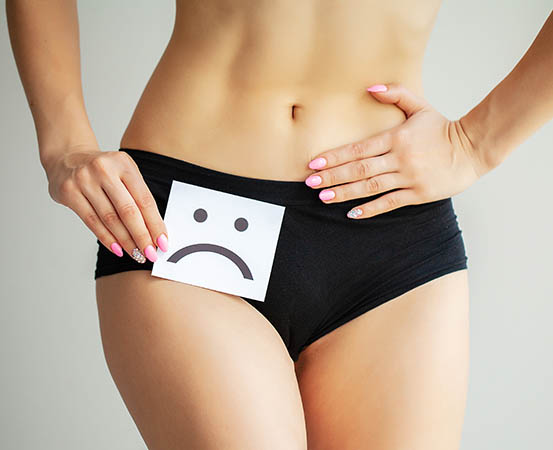
Regular menstrual periods every month are a sign of a healthy reproductive system and hormonal balance in the body. However, for some women and girls’ periods are cumbersome — especially if they experience agonising cramps, heavy flow or period rashes.
Period rashes develop in the genital area causing irritation, itching and swelling due to wearing sanitary pads. It affects the area outside and around the vagina, called the vulva. In severe cases, the vaginal area and the skin in the top inner side of the thigh and the buttocks may also get affected.
Not all women get period rashes, but for women who experience it every menstrual cycle, it can be a hassle to do daily activities during that time.
READ MORE :
Why you may be having trouble getting pregnant
Upsetting pregnancy scans: Handling bad news
A – Z guide to antenatal pregnancy tests
Bra code: to wear or not to wear a bra?
Symptoms of period rash
- Itching
- Inflammation
- Irritation and redness
- Dry, flaky patches of skin
- Pain and burning sensation
- Cracks in the skin
- Abnormal discharge from the vaginal opening
Causes of Period rashes
-
Poor menstrual hygiene
Many adolescent girls are not aware of how to use a sanitary pad and maintain hygiene during periods due to lack of information perpetuated further due to cultural taboos.
Those who do not have access to low cost pads and use old, unwashed cloth to absorb the blood are at high risk of contamination by germs and infections like bacterial vaginosis.
-
Prolonged usage of the same pad
“Many girls in schools and women in workplaces may not have access to clean spaces to change pads and end up keeping a single pad on for six to eight hours,” adds Kala Charlu, a menstrual hygiene campaigner and founder of Mitu Foundation.
“It is essential to give girls information on how and when to change pads and undergarments, and how to keep their genital area clean and dry. Many lower middle class girls and women insert old, dirty cloth into their vagina and keep it there for more than six hours. This is hazardous and breeds bacteria through the blood causing pelvic infections, closure of fallopian tubes, foul-smelling discharge and urinary tract infections,” says Dr Padma Srivastav, consultant obstetrician and gynaecologist, Motherhood Hospitals, Pune tells Happiest Health.
The friction of the pads rubbing against the skin can cause irritation and cracks. As the vulva is moist and warm, heat and humidity can worsen the problem causing inflammation, redness and rashes on the skin.
-
Allergies
“In our field work, we have noticed that commercial sanitary napkins sometimes cause allergy and infection for many women. So, we are encouraging them to use reusable cloth pads and menstrual cups through our awareness campaign,” says Kala Charlu.
Commercial sanitary pads, made of components like plastic, foam, absorbent gels and other synthetic material can irritate the sensitive skin in the vulva. Some pads are bleached and the chemical, dioxin in the bleach can trigger redness, rashes and swelling (vulvitis). Some women may be allergic to the adhesive used in pads.
“If the pads cause an allergic reaction, change the brand or use only pure cotton pads to avoid irritation and itching. Sometimes, the wetness and warmth in the vaginal area can result in a fungal infection (yeast infection caused by the fungus Candida) with symptoms of redness and rashes, which is often mistaken for an allergy. Consult a gynaecologist for clarification and get treated,” adds Dr Srivastav.
-
Social norms
According to the United Nations Children’s Fund (UNICEF), the menstrual health and hygiene needs of millions of girls and women around the world are not fulfilled because of gender inequality, discriminatory social norms, cultural taboos, poverty and lack of clean toilets and sanitary products. This not only puts them at risk of health hazards but also causes stress and anxiety.
How to avoid/get relief from period rash
- Change your sanitary pad at least once in four hours.
- Use only warm water to wash the genital area. Avoid harsh soaps, strong-scented feminine products or wipes.
- Keep the genital area clean and dry. Moisture causes bacteria/fungus build up.
- Wear underwear of the correct size made of breathable material that holds the pad in place.
- Consider switching from commercial sanitary pads to tampons, menstrual cups or reusable cloth pads.
- Certain topical creams and oral medications (as prescribed by a medical practitioner) can help heal the rashes.
- Consult your doctor immediately if the itching/inflammation are accompanied by fever or pain while passing urine.
Takeaways
- Rashes may develop in the genital area due to poor hygiene during periods, prolonged usage of the same pad and allergies.
- The individual may experience itching, inflammation, redness and irritation.
- We can avoid rashes by ensuring that the genital area is clean, change pads regularly and avoid pads that cause allergies.

















